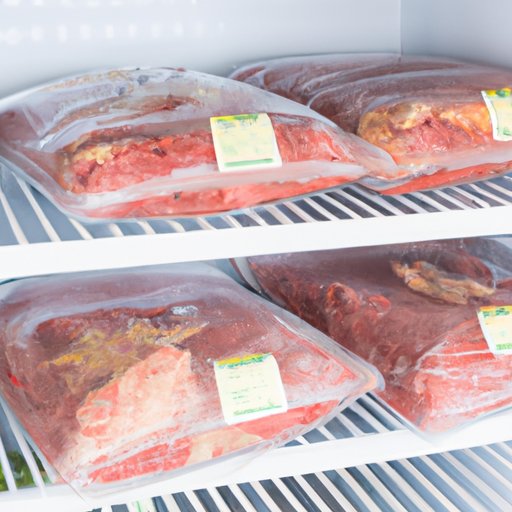Introduction
Frozen meat is a convenient way to have fresh, high-quality proteins on hand for meals. It can be stored for months at a time without losing its quality or flavor. However, it is important to know how long frozen meat can last in order to make sure you are consuming safe, healthy food. In this article, we will explore the shelf life of frozen meat and discuss how to maximize it by storing it correctly.

Comparing the Shelf Life of Frozen Meat in Different Storage Temperatures
The shelf life of frozen meat depends largely on the storage temperature. Generally speaking, the colder the temperature, the longer the shelf life. The recommended temperature range for storing frozen meat is 0°F (-18°C) to -10°F (-23°C). If the temperature is too warm, bacteria can begin to grow, causing the meat to spoil more quickly. On the other hand, if the temperature is too cold, the meat can become freezer burned, which reduces its quality and flavor.

How to Maximize the Shelf Life of Frozen Meat in Your Freezer
There are several steps you can take to maximize the shelf life of frozen meat in your freezer. First, select the right type of containers for storing the meat. Plastic bags and containers with tight-fitting lids are best for keeping out moisture and air. Next, package and label the meat properly. Make sure to include the type of meat, the date it was frozen, and the amount of time it should be cooked for. Finally, organize the freezer in such a way that allows for optimal airflow and prevents foods from getting lost in the back. This will help to ensure that all of the frozen meat is easily accessible and that the temperature remains consistent throughout.
Exploring the Different Types of Frozen Meats and Their Storage Guidelines
Different types of meats have different storage guidelines. For example, ground beef should be stored in the freezer for no more than three months, while pork chops can last up to six months. When it comes to preparing and cooking frozen meat, it is important to thaw it slowly in the refrigerator overnight. This will help to keep the meat’s flavor and texture intact. Additionally, it is important to cook frozen meat thoroughly in order to prevent any foodborne illnesses.
Tips for Maintaining Optimal Temperature in Your Freezer to Prevent Spoiled Meat
In order to keep the temperature in your freezer at an optimal level, it is important to set the thermostat to the correct setting. Most freezers should be set to between 0°F (-18°C) and 5°F (-15°C). It is also important to monitor the temperature regularly to ensure that it does not fluctuate. Additionally, it is helpful to use a thermometer to check the temperature of the freezer periodically. Freezing meat also helps to prevent freezer burn, which occurs when the surface of the meat becomes dry due to exposure to air.

An Overview of the Benefits of Storing Meat in the Freezer vs. Refrigerator
Storing meat in the freezer has several advantages over storing it in the refrigerator. Freezing meat slows down the growth of bacteria, which helps to extend its shelf life. Additionally, freezing meat locks in its flavor, making it taste fresher when it is thawed and cooked. Finally, freezing meat is a cost-effective way to preserve it, as it eliminates the need to buy fresh meat every few days.
Conclusion
Properly stored frozen meat can last for months in the freezer without compromising its quality or flavor. To maximize its shelf life, it is important to store it in the correct temperature range, use the right type of containers, and organize the freezer for optimal airflow. Additionally, different types of meats have different storage guidelines, so it is important to be aware of these when selecting and preparing frozen meats. By following these tips, you can ensure that your frozen meat stays fresh and safe to eat.


